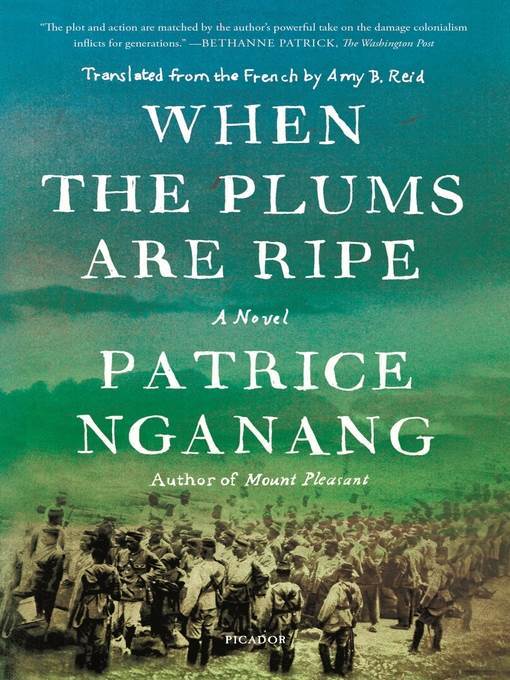
When the Plums Are Ripe
A Novel
کتاب های مرتبط
- اطلاعات
- نقد و بررسی
- دیدگاه کاربران
نقد و بررسی

June 1, 2019
What happens to a colony when its colonizer becomes colonized itself? That's the question underlying this layered story by Cameroonian novelist Nganang (Mount Pleasant, 2016, etc.). The second volume in a projected trilogy on his country's history before and during World War II, Nganang's richly detailed novel opens with an evocation of that magical time of year when plums come into season: "In Yaoundé, the heart of the country is revealed when the plums are ripe." Yet the fate of the plum is not happy: So many of them flood the marketplace that at the end of the day any unsold surplus is simply tossed into the street to be crushed by passing cars and trampled underfoot. Just so, Nganang writes, did the country discard its young men when they were pressed into service as riflemen fighting the Axis powers and Vichy France to liberate their Nazi-occupied colonizer. "Yes," Nganang queries, "was Cameroon going to remain under the control of a defeated country?" The answer, ironically, is that France will be freed from its oppressors long before Cameroon will, even as the intellectuals argue about the status of their homeland under foreign rule--"Even if France has always treated us as its colony, my brother, we are a protectorate, not a colony," says one. At the center of the story is the poet and bureaucrat Pouka, who silently watches his bosses secretly practice the Nazi salute as a precaution; a spinner of mathematically precise alexandrines, he insists on being called maestro, "following Mallarmé's lead." For all his fine ideas, Pouka, ever cautious, remains safe in the capital while the younger men in his circle go off to fight, each ending badly: "Hebga ran to where his friend was buried in the sand...chopped to bits...." A nice touch is another evocation, this one of Lysistrata, that brings the story to a close--and now with revolution in the air. "History is our one true mistress," Nganang ventures, but that mistress is unfaithful. A brilliant, beguiling story.
COPYRIGHT(2019) Kirkus Reviews, ALL RIGHTS RESERVED.

June 17, 2019
Nganang continues his rich, complex saga of WWII-era Cameroon with this second volume in a trilogy, after Mount Pleasant. Pouka the poet has returned to his village of Édéa after being educated by the French in the capital city of Yaounde. Fancying himself a man of letters, he starts a poetry group in the local bar. However, upon the fall of France to the Nazis, the poets are quickly thrown into the fighting that has spread throughout North Africa. Readers move from Pouka’s story to that of the poets under the questionable and racist leadership of French general Leclerc. Through the bloody battles of Kufra and Murzur in Libya, Nganang confronts the horrible history of French colonialism: the French’s use of “black soldiers for cannon fodder” in fighting the Axis powers; villagers armed with nothing but machetes, killed by the thousands. With a narrative structure reminiscent of African oral traditions, an unknown narrator heralds these men for their deeds and weeps for the sons and daughters of Cameroon: the young men who shed their blood for a Western country and the young women left behind, whose bodies were exploited and raped. With lyrical, soaring prose, Nganang sings their song, challenging the Euro-written history of colonialism and replacing it with a much-needed African one. The result is a challenging but indispensable novel.

July 1, 2019
Cameroon's capital city, Yaoundé, boasts a short plum season. Fruit unsold at day's end is discarded in the street, to be crushed underfoot. So too, are the tirailleurs sénégalais, the young Cameroonian men enticed with false promises into the Free French infantry fighting Italy during World War II. Poorly trained, these boys are sacrificed on the battle lines, cannon fodder for a cause not even theirs. In his difficult and disturbing new novel, after Mount Pleasant, Nganang exposes the evils of colonialism and the ramifications of violence for his native country, which suffered under the thumbs of three European powers. The story unfurls through the lives and friendship of two real-life characters, narrator Pouka, a pro-France poet and teacher, and Um Nyobi, a union leader and anticolonialist who eventually becomes the leader of the Resistance. Their heated debates reflect the bifurcated loyalties between Francophone and Anglophone Cameroonians that plague the country and the author to this day--serious subject matter tempered with bursts of droll humor. VERDICT A Stony Brook literature professor and an award-winning poet, Nganang is a political force whose experiences in Cameroon inform every page of this novel. Some will find it long on screed and short on plot. But for those who appreciate how fiction illuminates history, this book will be an eye-opener. [See Prepub Alert, 2/4/19.]--Sally Bissell, formerly with Lee Cty. Lib. Syst., Fort Myers, FL
Copyright 2019 Library Journal, LLC Used with permission.

























دیدگاه کاربران